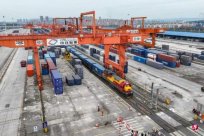He Weidong, member of the Political Bureau of the Central Committee of the Communist Party of China and vice chairman of the Central Military Commission, said that China is willing to strengthen border defense exchanges with Laos, promote the development of the relationship between the two armed forces towards a higher level, and jointly maintain regional peace and stability.
The Chinese Ministry of National Defense released news through the WeChat public account that He Weidong met with the General Secretary of the Central Secretary of the Laos People's Revolutionary Party and President Tonglun in the Laos capital Vientiane on Tuesday (December 5).
He Weidong said that the connection between the old and old landscapes is a socialist friendly neighborhood that is related to the future.Under the leadership of the leaders of the two parties and two countries, the development of the relationship between the two armies remained in a good momentum.China is willing to work with the old side to deepen exchanges at all levels, improve the quality and efficiency of joint performances, strengthen border defense exchanges, promote the development of the relationship between the two armies towards a higher level, and jointly maintain the peaceful and stable region.
According to the Ministry of National Defense of China, Tonglun said that the friendship between the old and China is not broken. Thanks to the Chinese side for giving strong support and assistance to the Laos party, government and army for a long time.
Tonglun pointed out that Laos is a supporter, practitioner, beneficiary of the "Belt and Road" initiative, and injecting an important driving force into the economic and social development of Laos.Facing the complex and changing international situation, I hope that the two armies will continue to strengthen communication and coordination and continue to deepen pragmatic cooperation in various fields.
He Weidong also held talks with Zhan Shamun, the Deputy Prime Minister and Minister of Defense on the same day to exchange opinions on the relationship between the two countries and the situation, international and regional situations.


